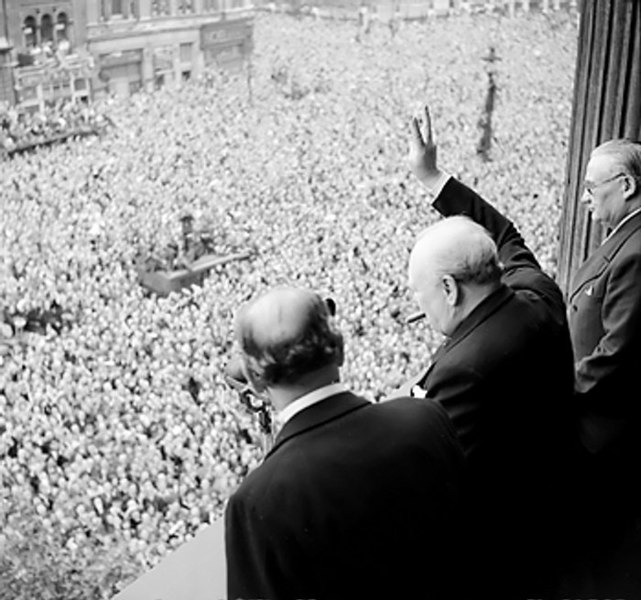8 May 1945: V-E Day
00:01
Churchill waves to crowds in Whitehall on the day he broadcast to the nation that the war with Germany had been won, 8 May 1945.
Image source: Wikipedia
Image source: Wikipedia
You are not forgotten.
Via Wikipedia.
Victory in Europe Day (V-E Day or VE Day) was May 8, 1945, the date when the Allies during the Second World War formally celebrated the defeat of Nazi Germany and the end of Adolf Hitler's Third Reich.More here.
On that date, massive celebrations took place, notably in London, where over a million people celebrated in a carnival atmosphere the end of the European war, though rationing of food and clothing was to continue for a number of years. In London crowds massed in particular in Trafalgar Square and up The Mall to Buckingham Palace, where King George VI and Queen Elizabeth, accompanied by the Prime Minister, Winston Churchill, appeared on the balcony of the Palace to cheering crowds. Princess Elizabeth (the future Queen Elizabeth II) and her sister Princess Margaret were allowed to wander anonymously among the crowds and take part in the celebrations in London.
In the United States, President Harry Truman, who celebrated his 61st birthday that day, dedicated the victory to the memory of his predecessor, Franklin D. Roosevelt, because he had been so committed to ending the war. Roosevelt had died less than a month earlier, on April 12.
The Allies had agreed to mark May 9, 1945 as V-E day, but Western journalists broke the news of Germany's surrender prematurely, precipitating the earlier celebration. The Soviet Union kept to the agreed date, and Russia and other countries still commemorate the end of the Second World War, a significant part of which is known as the Great Patriotic War in Russia and other parts of the former Soviet Union, as Victory Day on May 9.
By 8 May 1945, most of Germany had already been taken by allied forces. Hence V-E day itself was not such a drastic change for most German civilians. In the years after, V-E day was predominantly perceived as the day of defeat. But over the decades, this perception changed, culminating in the speech by West German President Richard von Weizsäcker on the 40th anniversary of V-E day in 1985, in which he called 8 May "the day of liberation" from the Nazi government.









0 Comments:
Post a Comment
<< Home